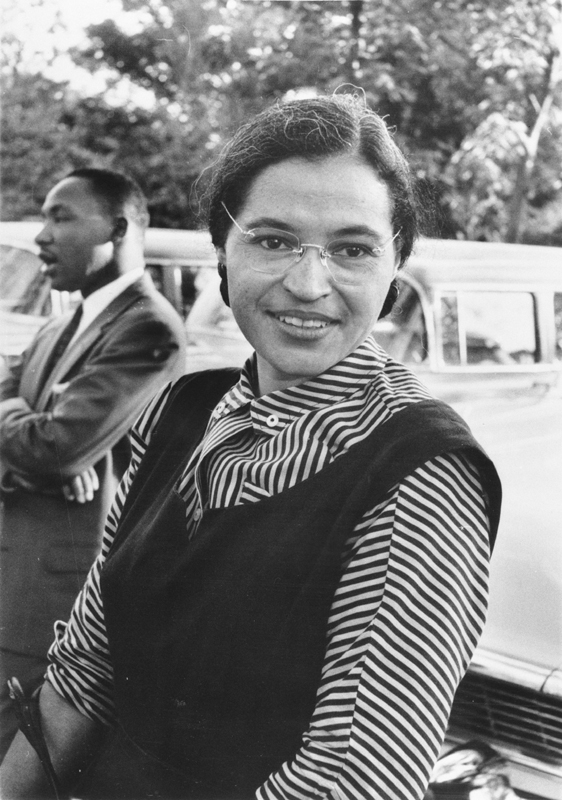Rosa Parks
Rosa Parks played a vital part in the Civil Rights Movements through her refusal to give up her bus seat to a white passenger. This action led to the Montgomery Bus Boycott and is often regarded as the start of the civil rights offensive.
Born on 4 February 1913, Rosa Parks grew up in segregated Tuskegee, Alabama. Her mother was a teacher and a member of the NAACP, as was her step-father. During her childhood, Rosa experienced the injustice of segregation firsthand. Despite the Supreme Court decree that schools should be “separate but equal”, Rosa’s school was woefully ill-equipped. One teacher was responsible for teaching up to 60 students. She attended school for five months of the year, the rest of her time was spent working on farms.
Despite being well-educated, Rosa could only find work as a seamstreess in Montgomery. She played an active part in the NAACP, serving as a local secretary and later as an adviser to the NAACP Youth Council.

She had also experienced the discrimination inherent on transport throughout the South. In 1943, after paying her fare for the bus, she was told to use the black entrance at the back of the bus. As she walked to the door, the bus drove off without her.
On 1 December 1955, Rosa Parks refused to give up her seat to a white man. Her arrest prompted a boycott of the buses that would last for 381 days. The boycott only ended after businesses complained that they were losing business as so few African Americans could get into town.
In 1956, the Supreme Court declared segregation on buses unconstitutional. Along with Brown v Board of Education decision of 1954 which called for the desegregation of schools, this ruling was of great significance in civil rights history.
When asked about what it felt like to have no civil rights, Rosa Parks said:
“Of course it felt like we should all be free people and we should have the same rights as other people. In the South, at that time, there was legally enforced segregation. There were places black people couldn't go, and rights we did not have. This was not acceptable to me. A lot of other people didn't disobey the rules because they didn't want to get into trouble. I was willing to get arrested — it was worth the consequences.”
The boycott’s success and Supreme Court decision changed Montgomery. However, it also created a lot of resentment against Parks. In the end, she was forced to move to Detroit to escape the racist attacks. In 1987 Parks and her husband set up the Rosa and Raymond Parks Institute of Self-Development. This organisation gave career training to black youths, as well as education on civil rights history.
Rosa Parks died on 24 October 2005, aged 92. Her body was brought to Washington D.C. to le in honour in the rotunda of the U.S. Capitol. This was the first time American who was not a government official to be honoured in this way.
See also:
MLA Citation/Reference
"Rosa Parks". HistoryLearning.com. 2026. Web.
Key facts
| Name: | Rosa Parks |
| Birth Date: | 4 February 1913, Tuskegee, Alabama |
| Death: | 24 October 2005, Detroit, Michigan |
| Occupation: | Civil Rights Activist |
